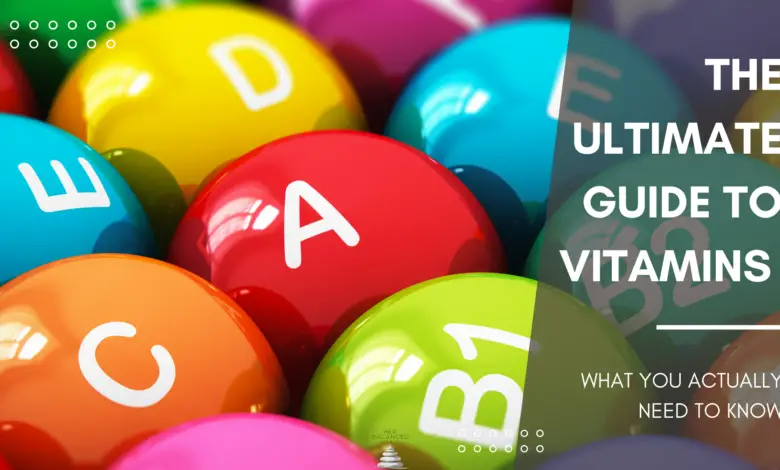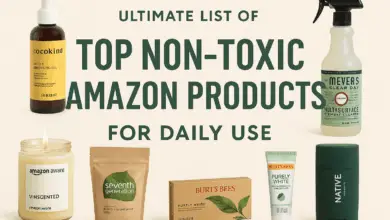The Ultimate Guide to Vitamins: What You Actually Need to Know

The Most Important Vitamins: What You Actually Need to Know
 Have you ever stood in the vitamin aisle, confused about which ones actually matter? You’re not alone. With so many choices, it’s hard to know which are the most important vitamins to take daily. In this guide, I’ll break down everything you need to know, including a vitamin chart (at the end) to help you choose wisely.
Have you ever stood in the vitamin aisle, confused about which ones actually matter? You’re not alone. With so many choices, it’s hard to know which are the most important vitamins to take daily. In this guide, I’ll break down everything you need to know, including a vitamin chart (at the end) to help you choose wisely.
The world of vitamins is like that one friend who keeps talking even when you’ve stopped listening – overwhelming, confusing, and sometimes makes you want to give up completely. But unlike that friend, vitamins are actually important.
As someone who once thought “vitamin C” was just a fancy name for orange juice, I’ve been on quite the nutritional journey. So grab your favorite healthy (or not-so-healthy) snack, and let’s demystify the wild world of vitamins together.
What Are the Most Important Vitamins & Why Do You Need Them?
 At their core, vitamins are organic compounds that our bodies need in small amounts to function properly. Think of them as the tiny managers of your body’s operations – not doing the heavy lifting themselves, but making sure everything runs smoothly.
At their core, vitamins are organic compounds that our bodies need in small amounts to function properly. Think of them as the tiny managers of your body’s operations – not doing the heavy lifting themselves, but making sure everything runs smoothly.
My personal “aha” moment came a few years ago when my doctor asked about my vitamin intake, and I confidently mentioned my daily gummy bears. The look on her face told me I might need to reevaluate my understanding.
The Essential Vitamin Guide
Let’s break down the most important vitamins and what they actually do for you:
Vitamin A 
Vitamin A is one of the most important vitamins for vision and immunity
What it does: Supports vision, immune function, and cell growth
Where to find it: Carrots, sweet potatoes, spinach
Personal note: I once ate so many carrots trying to improve my vision that my palms turned slightly orange. Spoiler alert: I still need glasses.
B Vitamins 
What they do: Help convert food into energy, form red blood cells
Where to find them: Whole grains, meat, eggs, legumes
Personal note: When I started taking B vitamins, my energy levels improved so much that my friends asked if I’d discovered coffee for the first time. Nope, just B vitamins!
Vitamin C 
What it does: Boosts immune system, helps wound healing, antioxidant
Where to find it: Citrus fruits, strawberries, bell peppers
Personal note: During cold season, I become the person who carries around a bag of clementines everywhere. My coworkers both appreciate and mock this habit.
Vitamin D 
What it does: Helps absorb calcium, supports bone health and immune function
Where to find it: Sunlight, fatty fish, fortified foods
Personal note: Living in a rainy city, I once didn’t see the sun for so long that my doctor actually wrote “get more sunshine” on my prescription pad. Now I supplement during winter.
Experts agree that the most important vitamins include Vitamin D, B12, and C.
Vitamin E 
What it does: Antioxidant, supports immune function
Where to find it: Nuts, seeds, vegetable oils
Personal note: I started adding almonds to everything after learning this. My morning oatmeal now has a satisfying crunch!
Who Needs Vitamins the Most? 
While everyone needs vitamins, certain groups might need to pay extra attention:
Seniors 
As we age, our ability to absorb certain nutrients decreases. Vitamins for seniors often focus on bone health, brain function, and immune support. My grandfather swears his daily multivitamin keeps him young, though his dad jokes suggest otherwise.
Men vs. Women
Men and women need different amounts of the most important vitamins, such as iron and zinc. Women often need more iron, while men might need different amounts of zinc and other nutrients. The “best supplements for men” aren’t necessarily the best for women.
Special Circumstances
Pregnant women, vegetarians/vegans, and people with certain medical conditions often have specific vitamin needs. When my friend went vegan, she had to create an entire spreadsheet to track her B12 intake!
How to Choose the Right Vitamins 
With so many options available, how do you know what you should take daily?
Check Your Diet First
Before supplementing, evaluate your diet. Most people can get sufficient vitamins from eating a varied, balanced diet. My attempt at tracking my food intake revealed I was getting plenty of some vitamins and barely any of others.
Get Professional Advice
Before starting any supplement regimen, consult with a healthcare provider. They can help determine if you have any deficiencies and what dosage would be appropriate. My doctor’s actual advice was far more helpful than the random blog posts I’d been reading (ironic, I know).
Quality Matters
Not all vitamin supplements are created equal. Look for reputable brands that undergo third-party testing. I once bought the cheapest multivitamin I could find, only to learn later that it had almost no bioavailability. You get what you pay for!
Common Vitamin Myths Debunked 
Myth 1: More vitamins = better health
Taking excessive amounts of vitamins won’t supercharge your health and can sometimes be harmful. When I learned this, I had to stop my friend from taking five times the recommended amount of vitamin C during flu season.
Myth 2: Everyone needs a multivitamin
If you eat a balanced diet, you might not need supplementation at all. I was shocked when my nutritionist suggested I drop my multivitamin and focus on just one specific supplement instead.
Myth 3: Natural vitamins are always better than synthetic
The molecular structure of many vitamins is identical whether they come from natural or synthetic sources. The “natural” vitamin I was paying triple for? Chemically identical to the standard version.
Vitamin Absorption and the Immune System 
One important factor often overlooked is how vitamins interact with our immune system. Certain nutritional classes absorb vitamins differently, which can impact how they support the immune system.
I never understood this until I got sick despite taking vitamin C religiously. Turns out, I was taking it at the wrong time of day, with foods that hindered absorption. Timing and food combinations matter!
Best Multivitamins By Age Group 
Finding the best multivitamin isn’t just about quality – age matters too!
For Those Over 60
Seniors often need higher amounts of certain vitamins and lower amounts of others. The best multivitamins for seniors over 60 typically contain more B12, vitamin D, and calcium. Best multivitamin for seniors over 70 is the most commonly asked google question which just tell me that elderly are now curious about how to gain better health.
For Middle-Aged Adults
People in their 40s and 50s may want to focus on heart health and preventing age-related issues. My “welcome to 40” present to myself was a heart-health focused supplement regimen.
For Young Adults
Younger adults might focus more on energy, stress management, and supporting an active lifestyle. The supplements that worked for me in college definitely aren’t the same ones I need now!
Tracking Your Vitamin Intake 
If you’re serious about optimizing your vitamin intake, consider these approaches:
Food Logging
Keep track of what you eat to identify potential gaps in your vitamin intake. My week of food logging revealed I was getting almost no vitamin E – no wonder my skin was so dry!
Symptom Tracking
Sometimes vitamin deficiencies have noticeable symptoms. Paying attention to how you feel can help identify potential issues. My perpetual afternoon slump turned out to be related to low B vitamin levels.
Regular Check-ups
Blood tests can reveal deficiencies your diet might be missing. I would have never known about my vitamin D deficiency without a blood test.

Vitamin Chart: The Best Food Sources of the Most Important Vitamins
Here’s a simple chart of vitamin-rich foods:
| Vitamin | Top Food Sources | Benefits |
|---|---|---|
| A | Carrots, Sweet Potatoes, Spinach | Vision, immune function |
| B | Whole grains, Meat, Legumes | Energy, brain function |
| C | Citrus, Strawberries, Peppers | Immune support, skin health |
| D | Fatty fish, Egg yolks, Sunlight | Bone health, mood |
| E | Nuts, Seeds, Vegetable oils | Antioxidant protection |
| K | Green leafy vegetables, Broccoli | Blood clotting, bone health |
 FAQs About Vitamins
FAQs About Vitamins
What is MCG in vitamins?
MCG stands for microgram, which is a unit of measurement for vitamins. It equals one-millionth of a gram, showing just how little of these powerful nutrients we actually need!
Which nutritional class absorbs vitamins and sustains the immune system?
Vitamins work with different nutritional components like proteins and fats to support the immune system. Fat-soluble vitamins (A, D, E, K) need dietary fat to be properly absorbed.
What are the most important vitamins should I take daily for a man?
Men often benefit from vitamins D, B12, and antioxidants like A and C. However, individual needs vary based on diet, age, and health conditions.
What vitamins should men take daily?
Men should consider vitamins that support heart health, muscle maintenance, and energy levels. Always consult with a healthcare provider for personalized recommendations.
What are the 60 essential nutrients?
While there aren’t exactly 60 essential nutrients, humans need a combination of vitamins, minerals, amino acids, and fatty acids. Vitamins make up 13 of these essential nutrients.
Are vitamins inorganic?
No, vitamins are organic compounds, meaning they contain carbon. This distinguishes them from minerals, which are inorganic elements.
What vitamins should a man take daily?
Men may benefit from vitamins D, B complex, and antioxidants, but needs vary based on age, diet, and health status.
What is the symbol for micrograms?
The symbol for micrograms is “μg” or “mcg” in cases where the μ symbol isn’t available.
What vitamins for elderly?
Elderly individuals often need more vitamin D, B12, and calcium. As we age, our ability to absorb nutrients decreases, making these supplements potentially more important.
MCG in vitamins?
MCG (microgram) in vitamins refers to the dosage measurement. Different vitamins have different recommended MCG levels based on dietary needs.
MCG unit of measurement?
MCG is a unit of measurement that equals one-millionth of a gram (0.000001g), commonly used for measuring vitamins and other nutrients needed in small amounts.
Vitamin food chart?
A vitamin food chart typically shows which foods contain significant amounts of each vitamin, helping people plan diets that meet their nutritional needs naturally.
Best vitamins for 80 year old man?
80-year-old men often benefit from vitamin D, B12, and calcium supplements to support bone health, energy levels, and cognitive function.
What criteria must a nutrient meet to be classified as a vitamin?
To be classified as a vitamin, a nutrient must be organic, essential for normal body function, not made by the body (or not in sufficient quantities), and cause specific deficiency symptoms when lacking.
 Conclusion
Conclusion
Navigating the world of vitamins doesn’t have to be as complicated as it first seems. By understanding your unique needs, consulting with healthcare professionals, and making informed choices, you can use vitamins to support your overall health and well-being.
Remember that one person’s perfect vitamin regimen might be completely wrong for someone else. My partner and I take completely different supplements despite sharing the same fridge and pantry!
The most important takeaway? Listen to your body, consult with professionals, and remember that vitamins are supplements to a healthy diet, not replacements for good nutrition.
Now if you’ll excuse me, I need to go eat something green before taking my vitamin D supplement – turns out, timing really does matter!
Here is the link to download my essential vitamins chart that has every information you need for every vitamin available! This vitamin chart will help you identify the most important vitamins in your diet.
Disclaimer: This blog post is for informational purposes only and should not be considered medical advice. Always consult with a healthcare professional before starting any supplement regimen.

